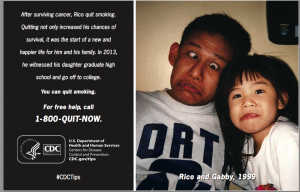A powerful Filipino story in U.S. crusade vs. smoking
Smoking kills, but in the Philippines and the United States the habit just won’t die.
Which is why Rico Foz, a San Francisco Bay Area Filipino businessman, is speaking out.
The 48-year-old entrepreneur has been sharing his painful, moving story of how smoking devastated his life, and how he fought back and reclaimed it.
Smoking killed Rico’s father and it nearly killed him. Smoking destroyed his health to the point that he could not find a job. It led to the loss his family home and left Rico sinking deep into depression.
Last week, Rico, became the first Asian American voice in a major U.S. campaign against smoking.
“We lost everything we had,” he says on the Centers for Disease Control and Prevention’s Tips from Former Smokers campaign page.
I wrote about this campaign when it launched a few years ago. It featured powerful videos of Americans whose lives were destroyed by nicotine. One of them was Terrie who, in a 30-second clip, shows how smoking wrecked her voice, her looks and her health.

It’s a much-needed campaign in a country where smoking is still a serious threat.
Smoking is the “the single largest preventable cause of death and disease in the United States,” according to the CDC. “Cigarette smoking kills more than 480,000 Americans each year, with more than 41,000 of these deaths from exposure to secondhand smoke.”
Rico’s story would be familiar to many Filipinos. He learned to smoke as a young boy in Manila. He even lit cigarettes for his dad, a heavy smoker who later died of cancer.
“I was an addict,” he told me. “I knew the risks. But if there were 1,000 studies on the dangers of smoking, I had 1,000 excuses. Namatay pa nga ang dad ko sa cancer, hindi pa ako nagising doon.”
At the height of his nicotine addiction, Rico smoked two packs a day. He had little need for matches or lighters back then — he would use a cigarette he’d been smoking to light a new one.
“Talagang adik. Wala ngang silbi ang posporo or lighter. Iyong papaubos e siyang ko na ring pansindi.”
Then about five years ago, Rico got diagnosed with esophageal cancer.
It was a shocking wake-up call.
“Naku, marami pa akong hindi nagagawa. Bata pa ang mga anak ko,” he recalls telling himself. By then the choice was clear. “You’re choosing between addiction and possible death.”
He chose life.
On February 17, 2011, the day before he was to undergo surgery, Rico quit. He’s been nicotine-free since then.
But his battles were just starting. Surgery saved his life. But he went through a painful recovery phase.
He couldn’t find a job and he and his wife, Meryl, were forced to give up their home on the East Coast. Rico struggled with depression.
“I was in deep pain, helpless to move about, very dependent on Meryl. Walang trabaho. Parang walang silbi na rin.”
They decided to move to California to be near Rico’s sister.
Slowly, they bounced back. They started their own business.
Rico became an entrepreneur and is now CEO and president of Careway Health Initiatives, which offers certification courses for healthcare professionals.
Hoping to spread the word about the dangers of cigarettes, Rico volunteered to help and later became a spokesman for an Asian American anti-smoking campaign.
His personal story is so powerful it drew the attention of the CDC, which invited him to be the first Asian American spokesman for its anti-smoking drive.
Convincing Filipinos in the U.S. to quit isn’t always easy, he frowns. Sometimes, he turns to shock and sarcasm: “Kung talagang matigas ang ulo ninyo, ito lang na lang siguraduhin ninyo: na marami kayong pera para sa hospital bills. At marami kayong pera para sa pamilya ninyo pag namatay kayo.” (To the hardheaded, just make sure you have lots of money for hospital bills and for your family when you die.”
“It’s way much cheaper to quit.”
Visit the Kuwento page on Facebook at www.facebook.com/boyingpimentel
On Twitter @boyingpimentel
Like us on Facebook
